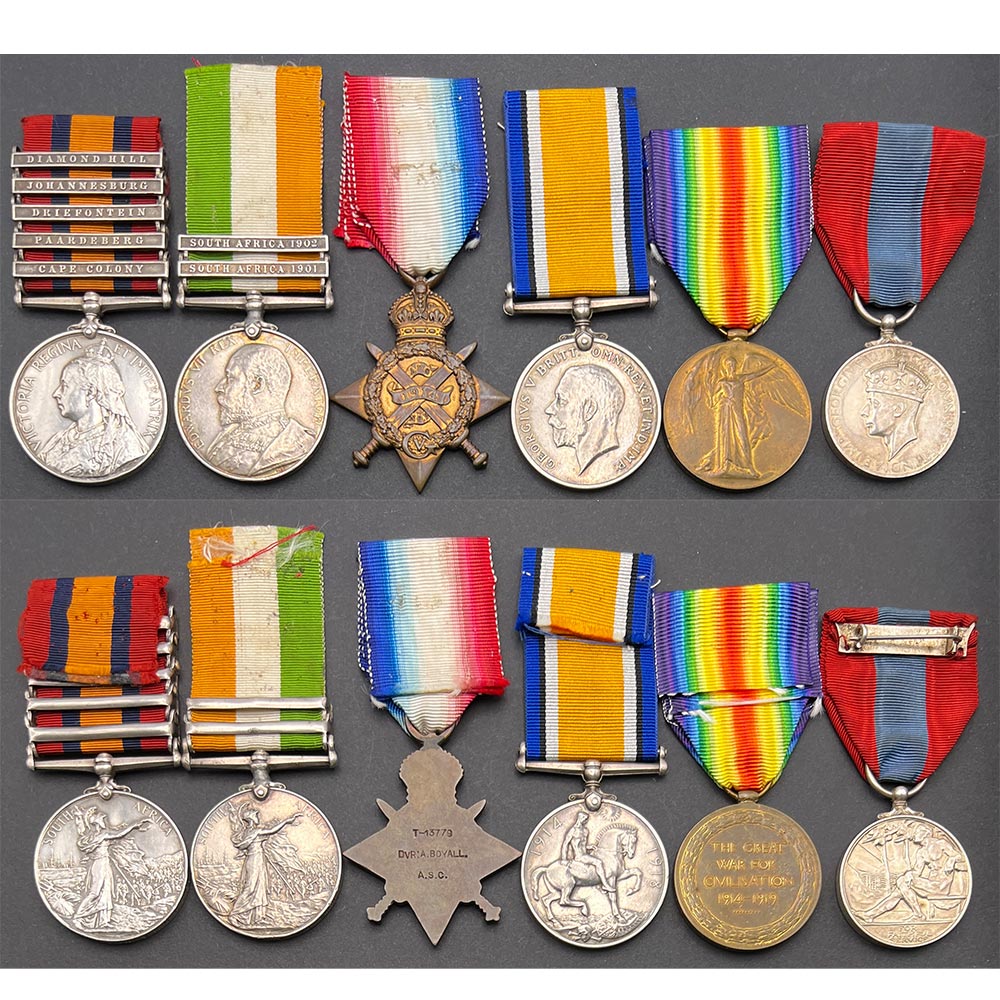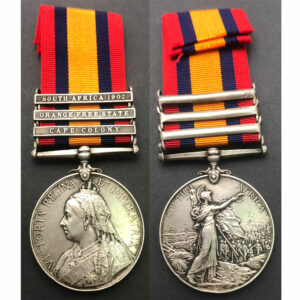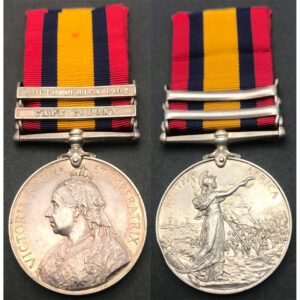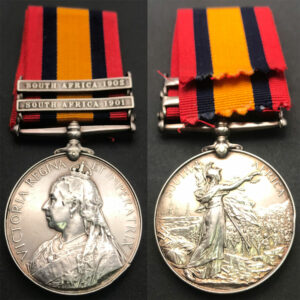Description
Queen’s South Africa Medal, 5 bars, Cape Colony, Paardeberg, Driefontein, Johannesburg, Diamond Hill, King’s South Africa, 2 bars, SA 1901, SA 1902, 1914 Star, British War & Victory Medal, Imperial Service Medal, GVI, 13779 Driver Arthur Boyall, Army Service Corps.
QSA officially impressed: “13779 DR: A. Boyall A.S.C.” Large style impressing, early issue with ghost dates.
KSA officially impressed: “13779 Dvr: A. Boyall. A.S.C.” Roll records 4th Company A.S.C.
1914 Star officially impressed: “T-13779 Dvr: A. Boyall. A.S.C.”
WW1 Pair officially impressed: “T-13779 A. Cpl. A. Boyall. A.S.C.”
ISM officially impressed: “ARTHUR BOYALL”
WW1 medal index card records early entry into the war, arriving in France on 17th August 1914, with the 5th Cavalry Brigade Head Quarters, Army Service Corps.
Did not earn the clasp as he seems to have been at the HQ in the early stages of the war?
Following service in France, he returned home in Sept 1915 to be deployed to East Africa from 24th Dec 1915 to 10th Dec 1916, before spending 2 years in Egypt with the Exp Force Egypt from Dec 1916 until 14th March 1919.
Arthur Boyall was born circa 1880 in Spilsby, Lincoln, Lincolnshire.
At the age of 18 and 1 month he signed up with the British Army, joining the Army Service Corps at Aldershot on 8th February 1898. He had worked as a Groom, which would be useful in the ASC as they handled the transport via horses.
He came whilst underage from the local Militia being part of the “F Company, 1st 8th Bn Lincolnshire Regiment” Militia.
He would go on to see extensive service over a long career lasting from 1898 all the way until 1919.
He saw the following postings during his career:
Home, 8th Feb 1898 – 5th Oct 1899
South Africa, 6th October 1899 – 14th September 1902, Boer War Service
Home, 15th September 1902 – 16th August 1914, Army Reserve period.
British Expeditionary Force Overseas (France), 17th August 1914 – 20th September 1915
Home, 21st Sept 1915 – 23rd Dec 1915
East African Expeditionary Force – 24th Dec 1915 – 10th October 1916
Egyptian Expeditionary Force (Egypt Theatre), 11th Dec 1916 – 14th March 1919
Home, 15th March 1919 – 30th May 1919.
His conduct on discharge form dated 28th Feb 1919 reads:
Unit: 922 Company, Royal Army Service Corps, 54th Divisional Train
Q. How has he been employed in the Army? A. Transport Corporal
Q. Sobriety? A. Sober
Q. Is he reliable? A. Yes
Q. Is he intelligent? A. Yes
Q. He has shown any special aptitude for employment in Civil Life? A. Accustomed to the handling of animals.
Q. Another other facts regarding him you with to be noted? A. Cpapable and Hard Working Non Commissioned Officer.”
CIVILIAN LIFE AND FAMILY
Born in Spilsby, Lincoln on 21st December 1879, to Alfred Boyall, who came from Stamford, Rutland, and Jane who came from County Down, Ireland.
Following his full time service in the Army between the Boer War and WW1 he was in the Army Reserve and returned to working as a Groom in his home town of Spiilsby Lincolnshire.
He would later become a Postman, which be the source of his Imperial Service Medal later in life for long civil service.
His retirement around the time of the ISM aged 60 was recorded in the Lincolnshire Echo, 27th March 1940:
“MR Arthur Boyall who has retired after being a postman at Spilsby for 27 years, has been presented by Mr S. Rattenbury the Post Master, with a tea service from the indoor and outdoor postal staffs.”
He was noted a number of time in the local newspapers in Lincolnshire, a couple fine heres and there for speeding on his horse and cart as well as finding making the sad discovery that one if his coworkers hard died.
In 1923 he went to visit a missing friend, the highly respected postman Henry Beaver, when Arthur visited his home, he found him dead in his deck chair from self inflicted wounds.
In April 1957 he was in a car crash and spent some time in Spilsby hospital with a head wound.
He later died in Spilsby during 1958 aged about 78.




